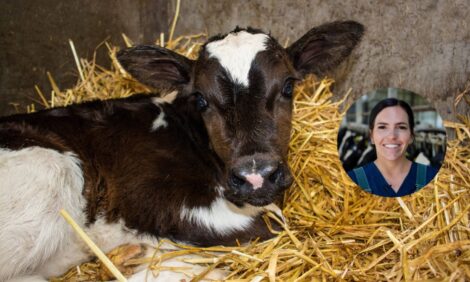



Data from dairy cows forms a new knowledge hub
The Swedish University of Agriculture is participating in a new knowledge hub that will support the digital transformation of Swedish agriculture. SLU contributes expertise, data and experience from Gigacow, the infrastructure for cow data, which is an important part of SLU's work with digitalisation.The Swedish University of Agriculture is participating in a new knowledge hub that will support the digital transformation of Swedish agriculture. SLU contributes expertise, data and experience from Gigacow, the infrastructure for cow data, which is an important part of SLU's work with digitalisation.
The goal is to, together with farmers, combine genomic breeding evaluation with better metrics for production optimization in an environment where both technology and climate are changing ever faster.
The background to SLU Gigacow is that the digitization of agriculture makes it possible to collect more and more data from our dairy farms using automated methods.
Close to practical reality
At SLU's own research farms Lövsta, Röbäcksdalen and Götala, researchers and companies can conduct experiments and carefully controlled studies. Just as in healthcare, trials must not only be carried out in a research environment, but also tested and validated in environments that mimic reality as much as possible.
The work with the Gigacow network also creates a contact surface where researchers, advisors and farmers continuously collaborate with the infrastructure and come up with their own proposals both for future technology and how existing technology can be used more efficiently.
Within SLU, there is knowledge about farm animals and crop cultivation, but also great digital competence, not least through the SLU Gigacow platform. There, scientific methods are combined with test farms so that new knowledge is obtained that has its basis in the needs and context of reality. The fact that the test farms are located in different parts of the country makes the whole thing extra interesting," says Karolina Murhman at Linköping University, one of the two operational managers for the knowledge hub
Systems for data sharing are being built up
In addition to data collection from the farms' equipment, SLU Gigacow finances genome analysis of the cows that live on farms in the network and collaborates with other actors such as Växa Sverige and DeLaval with the aim of developing how agricultural data is exchanged and shared in Sweden.
SLU Gigacow was built from the beginning to utilize data for research purposes and thereby shorten the time from research idea to practical use. Almost immediately, we also began to be used as a knowledge hub regarding digitization and technology for farm animals, and it's fantastic that we now have a clearer role in that work, says Tomas Klingström, who has worked with SLU Gigacow since its inception.
There is a huge ecosystem of different data systems that is currently being built up with data sharing via Agronod and many different companies and authorities that make interfaces available for data sharing, where many at SLU can contribute both as experts and qualified users to drive development in right direction.
Courses and seminars
Within the Knowledge Hub, SLU will provide data from SLU Gigacow and have an important role in monitoring and analyzing the environment. They will also do training efforts in the form of courses and seminars and participate in the work with the development of standards for Agridata.
The hub is also connected to an expert network with representatives from Farm and Animal Health, Lovang Lantbrukskonsult, Ludvig & Co, Växa Sweden, LRF, AI Sweden c/o Lindholmen Science Park, DeLaval, Väderstad, IoT world, Sweden Secure Tech Hub and Agtech Sweden.
The formalized expert network has both broad and deep competence in agriculture and digital technology and will be responsible for a large part of the hub's activities, says Per Frankelius, Linköping University, who together with Karolina Muhrman, LiU, will lead the hub.
Within SLU Gigacow there is a vision to combine bioinformatics with sensor data, or simply to combine genetic knowledge with sensor data and behavioral data. This forms the basis for qualified development processes in everything from breeding to feed optimization, says Per Frankelius in conclusion.


